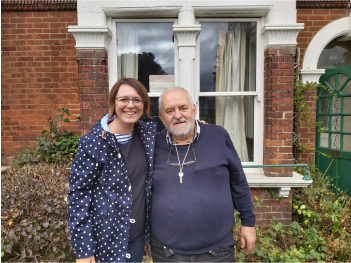About project
The fact that I primarily teach people – and not only English – somehow intuitively became clear to me from the beginning. When I first met Mario Rinvolucri at a conference in 2009, I was completely fascinated by his teaching approach. It’s not about endless preparations, tools and technological gimmicks. It’s important to perceive the student and know how to give them what they need in the moment, as they need it, for them to be able to learn things. At that conference, Mario wrote a sentence on the board, said one more sentence, and we couldn’t stop for an hour, discussing and writing endlessly. It took me a while to understand that it’s not just about one sentence and that being able to work with a group like that is mastery.
In the following years, my teaching ambitions were consumed by building a school, and I had to develop more as a manager than as a teacher. However, in 2017, the late Jim Wright, Principal of Pilgrims, invited me to a course with Mike Shreeve, for which I am still very grateful. At that time, I met Mario again; he invited me along with others for lunch in his garden. I was fascinated by his storytelling, and he was fascinated by my enthusiasm and desire to dedicate myself to teacher education. He told me about his notes and papers sorted out from his office because he didn’t want his sons to throw them away when he’s no longer around, and I was curious about what was in them.
From today’s perspective, they are not treasures; they are papers from the office of a wise and widely educated person who, in my opinion, had a transformative impact on many teachers around the world, and consequently, on English language teaching. However, from a historical perspective, what wouldn’t we give for boxes full of papers from, for example, J.A. Comenius’s office?

We sat down as people, started talking a lot, and I regularly visited him in the UK. We met for 2-3 days and discussed (even argued) about various things. For example, why tests in schools are not useless, but we never agreed on that. Gradually, our discussions led to a project, which we initially called an archive, then a resource bank, and finally, it became HLT.digital.
Over the years, I organised international conferences and know quite a few people in our field, but in conversations with him, I realised how many people I don’t know. I realized that Mario is by no means the only master, that there are many more such people, many of whom disappeared from the scene, and their work remained forgotten in papers from the time before the internet.
Moreover, we live in the 21st century, where there is lively discussion about the importance of an individual approach and perceiving students as people. Conferences are full of such discussions, but few talk about people who devoted decades to it before the internet. The problem, of course, is that practically no one can access their findings, materials, wisdom and experience.
All of this led us to come up with a project in which we would try to capture and convey this information to teachers in the 21st century. Let them not reinvent the wheel; let them build on what our colleagues discovered long ago. Let’s move forward and at the same time express respect and admiration for our older colleagues.
When we started implementing the project with Mario and created the first video recordings, interviews with some practitioners, the pandemic came. It interrupted our cooperation for several reasons. I had to focus fully on transforming the school, and Mario was going through a very difficult period in his personal life.
However, the agreement was that I would continue the project and build a virtual space that would be a source of information about people working in the 60s, 70s, 80s, and 90s, basically before the internet. Our goal is to make their knowledge and experience accessible to contemporary teachers and give them the opportunity to build on their work.
The project started to outgrow the borders of UK and Slovakia, soon we realised that we could gain further valuable insights from international partners and wider international cooperation. The project was supported by the Erasmus+ programme and got wider recognition not only within Europe but also around the world. The project was expanded by partners from Poland, the Canary Islands in Spain, Italy and the United Kingdom. Later, we suddenly lost our UK partner, Susan Holden, who was a significant member of the team and a representative of the generation whose work we were trying to capture.
In the project, we deviated from the original plan to focus only on the post-war generation and expanded it to include Generation X. However, we had a good international team of project partners who genuinely cared about the outcome. I think that together we laid the foundation for a valuable source of information, experience and knowledge for future generations of English teachers.
Klaudia Bednárová, The Bridge
